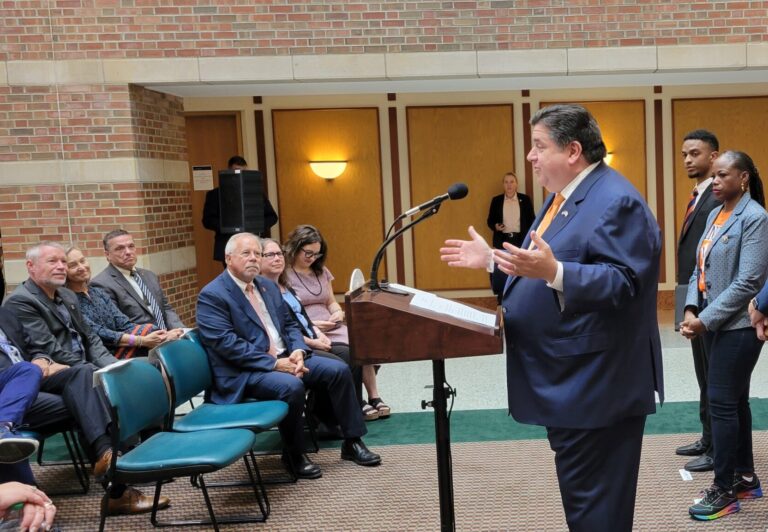URBANA – Governor JB Pritzker hopes lawmakers will come up with an amended version of SB76, a bill he vetoed on August 11 that would have ended Illinois’ moratorium on building nuclear power plants.
During a visit Monday to the University of Illinois Urbana-Champaign campus to promote the state’s increases in higher education funding, Pritzker said that despite his veto, he favors the bill as a way to allow the construction of small modular reactors, or SMR’s.
Pritzker’s veto of the bill has been interpreted as a criticism of SMR’s by both supporters and opponents of nuclear power. But the governor said he has high hopes for the new technology. In answer to a question about the bill, Pritzker said that, once perfected, small modular reactors could allow manufacturers to power their facilities with their own reactors.
“Now you can actually put an SMR on the site that is just big enough to power that manufacturing facility,” said Pritzker. “Think about the jobs that we could create if the technology proves to be safe and to work properly and so far it does.”
But Pritzker says he vetoed the bill because of an amendment that specified that any new nuclear facility in Illinois be “an advanced nuclear reactor” as defined by federal law. In his August 11 veto message, the governor criticized the amendment as being too vague, and possibly allowing for more large nuclear plants to be built. He said building large facilities could be so costly that they require ratepayer-funded bailouts. Pritzker also said the bill lacked new health and safety regulations for new nuclear plants.
Supporters of SB76 say it passed both the Illinois House and Senate with veto-proof majorities. They are calling for a vote to override the governor’s veto. But Gov Pritzker says he hopes the bill can be amended instead to address his concerns about allowing more large nuclear plants in the state.
“I believe that that that that my veto will not be overwritten,” Pritzker said. “And I believe strongly that we should bring small modular reactors to Illinois.”
Illinois has six active nuclear power plants hosting eleven nuclear reactors, more than any other state. But some have struggled to find customers for their electricity, using the Midwest’s current electrical grid.
Welcoming students and taking credit for higher education funding
Pritzker’s comments came at an appearance at the University of Illinois’ Beckman Institute to welcome students on the first day of fall classes. While only a handful of students were present in person for the event, the governor told the gathering that all students were benefiting from increases in state university funding. And he noted that an increase in MAP (Monetary Award Program) grant funding to an all-time high level meant that all eligible applicants demonstrating financial need would receive funding.
The governor drew a line from the increased funding to an increase in enrollment at state universities in Illinois.
“You are an elite group,” said Pritzker. “You see, across the nation, college first-year enrollment went down 2.4%. But not here in Illinois. Enrollment has gone up.”
Earlier, University of Illinois Urbana campus chancellor Robert Jones had alluded to the enrollment increase, although fall enrollment figures are not calculated until figures are available from the tenth day of the semester.
“I can’t make any announcements about the number of new students or the total enrollment but let me just say in the words of a big car salesman in the state of New York that I will never forget, it’s HUGE,” said Jones, drawing laughter from his audience with his reference to the late Billy Fuccillo.
According to the governor’s office, state funding for the University of Illinois system is up by $41 million for FY 2024, to $632 million. Funding for other public universities in Illinois is up by 7%, the largest increase in more than 20 years.
Despite the increase in funding, Pritzker acknowledged that direct funding to state universities in Illinois is still below levels of a quarter-century ago. But he said the state was making progress and held out hope for more increases in the years ahead.
“If you look at the curve, it is absolutely heading in the right direction,” Pritzker said. “And I would hope that we would be able to restore even more funding to four-year universities across the state.”

